
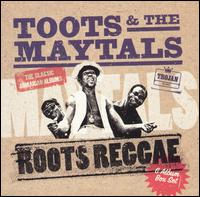 Toots and the Maytals: Roots Reggae: The Classic Jamaican Albums, Trojan, 6 CD box set, 2005
Toots and the Maytals: Roots Reggae: The Classic Jamaican Albums, Trojan, 6 CD box set, 2005
Rating: A
Is this an admirable concept or what? Six of The Maytals early vinyl albums faithfully reproduced, each on its own CD, each encased in a miniature version of the original cover design. Digitally enhanced, obviously, but not otherwise amended or expanded or improved with outtakes or singles or live versions. No extras added. None needed.
Compare that to, for the most extreme example on my shelf, The Velvet Undergrounds box set from 1995, an expansion of their first four albums to five CDs and well over twice the original length. How was that done? With a plethora of other stuff. Thats the way boxes were made then.
So thats the situation in a two-paragraph nutshell. Plain and simple, sweet and dandy is what you get here: Toots in six easy half-hour sessions, more or less, with occasional duplications and alternate versions. Thats the way records were made then. Then in this case means 1965 to 1974, so the music ranges from the mixture of heavily gospel-influenced ska and schmaltz on their second album to the heavily gospel-influenced mature reggae of In The Dark. Their initial album, a Studio One production, is missing from this set, as is their Prince Buster-produced material, but this does include their three albums with Leslie Kong as well as three from the Dynamic Sounds studio. On each, at least half the material is perfectly sublime, half the rest is bloody marvellous, half the remainder is damn good, and the remnantswell, its still Toots.
Most reggae fans will already be familiar, perhaps overly so, with many of the songs in this set, such as Never You Change and My New Name from Disc 1, Monkey Man and Sweet and Dandy from Disc 2, Bla Bla Bla and Pressure Drop from Disc 3, Peeping Tom and 54-46 Was My Number from Disc 4, Louie Louie and Pomps and Pride from Disc 5, Time Tough and Sailing On from Disc 6. Wonderful songs, spirited performances. Resist them in this format if you wish, but be advised that unless you already have all six of these albums youd be missing many additional pleasures. If you do have all the albumswell, its still Toots, isnt it. Early Toots. Digital early Toots.
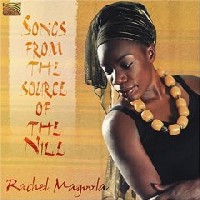 Rachel Magoola: Songs from the Source of the Nile, ARC, 2006
Rachel Magoola: Songs from the Source of the Nile, ARC, 2006
Rating: A
This CDs title, Songs from the Source of the Nile, suggests a compendium of traditional music, right? Faithful, earnest renditions of the folk music of deepest Africa? In fact this is a contemporary compilation from a splendid Ugandan singer whose music-making is influenced by the past, but it sure isnt stuck there. In fact, seven of the twelve tracks were written by Magoola, the rest being her modern arrangements of time-honored songs from various tribes.
The performances are memorable for their sparkling musicianship and wonderfully zipping (alternating at times with nicely relaxing) rhythms, some of which even have tinges of reggae. The singing is memorable for its expressive, light, often playful touch. The melodies are somewhat less memorable: very engaging while theyre happening but quickly forgotten once weve moved on to the next just a few stick pleasantly in the brain.
To keep things interesting, many of the songs have several distinct parts (a trait I always enjoy), progressing from one type of arrangement to another. Ekizino, for example, starts slowly with a steady thump and choral chant; the tempo increases as the handclapping takes on a more complex beat and insists on guiding our enjoyable journey up, down and all around the rest of the song. Typically of African music, these songs are intended to be danced to, the subject matter being mostly human relationships and significant life events. (Circumcision anyone, accompanied by a piercing electric guitar?) One notable exception in topic: Inhaife is about the resumption of royalty in Uganda after Edi Imins rule; it features a gently rolling rhythm and stately, dignified vocal.
Its music like this that always makes me wonder how it is that residents of some of the poorer countries produce some of the most joyous music around.
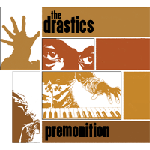 The Drastics: Premonition, Jump Up Records, undated
The Drastics: Premonition, Jump Up Records, undated
Rating: B+
An urgent, hollow drumming calls us from the distance, and we willingly rush over to see whats up. When we get there were welcomed by a vocal scratch of Lee Perry (it sure sounds like him) and comforted by a tuneful riff of brass. A solo sax offers help in exploring this new land, and pretty soon theres organized banging and crashing all over the place. Its reggae territory, but the surroundings are in motion. Its a dub zone.
That was the first track. The second starts like a battered, warped 78 rpm record but magically transforms into sparkling clean dubbed-up sounds with a good deal of Augustus Pablos far east sound. More follows, with occasional deejay-style pronouncements from Craig Akira Fujita; then comes another rhythm workout, the horns tantalizing us with partial melodies. Five is half ska, half urgent rocksteady (if thats possible), with lively guitar, lots of horn, lots of dub and an actual tune.
Track six is slow and deliberate, relaxing and mysterious at the same time, until Vandell Harris finally shows up to deliver a non-relaxing rap about everything thats bothering him. His spot in the center is eventually overtaken by a sax and then by pure bass. Despite its title, or perhaps in keeping with it, Bulletproof offers respite from the fuss and fury of the world: a calm, orderly, peaceful reggae instrumental, dubbed up just a bit. Dr. Ring Ding deejays us back to reality in Wild Bunch with an old-school toast that progresses into a much fasta chatta toward the end.
Number nine is deep dub indeed: even the rhythm and deejaying (by Prince G) are subdued and distant. Ten is straight instrumental/dub reggae. Some great hand drumming introduces track eleven; it turns into a basic one-drop with Fujita again on Lee Perry-inspired vocals. Fistful a riddim is with and by King Django; it reframes a highlight from his own recent album. And if youre patient, theres an unlisted, brief song segment tagged on after many seconds of silence at the end of #12.
I had kind of a feeling about The Drastics Premonition, and sure enough, I like it a lot. Theres nothing too drastic here, mind you merely highly creative and entertaining variations on the kind of music I love. Thats all.
 Various: All Shook Up: A Reggae Tribute to the King, Trojan/Sanctuary, 2005
Various: All Shook Up: A Reggae Tribute to the King, Trojan/Sanctuary, 2005
Rating: B+
When this disc arrived in my mailbox I immediately drove over to my local laundromat, where sure enough, Elvis himself was slouched against a washer. He kindly agreed not just to give a listen, but to offer his opinions. Yes sir, he said. Ill do that. Going a bit bald, but such a nice guy.
So these are Mr. Presleys reactions to the reggae tribute to himself (thanks to his slow drawl I was able to transcribe accurately):
Dont Be Cruel by Chaka Demus and Pliers: Sure is sung different. Nice toast, and real lively. I like that.
All Shook Up by Jackie Edwards: Sure is relaxed, considering hes supposed to be shook up about being in love and all. Sure is a nice dub bit at the end.
One Night by Jackie Brown: A real nice country n western tearjerker inna one-drop stylee. Guy sure sounds vulnerable.
Are You Lonesome Tonight by Pat Kelly: My sexy spoken part is intact. Good stuff.
Wooden Heart by Hortense Ellis: Heartfelt without being maudlin; real nice riddim. Sure aint my phrasing.
Frankie and Johnny by Eugene Paul: Real easy rockin. Sounds like Sam Cooke.
How Great Thou Art by Cedric Potier with Byron Lee and the Dragonaires: Refreshingly blithe, aint they? Its a helluva lot better than George Beverly Shea. I still like Dolly Partons version best, though.
In the Ghetto by Susan Cadogan: Not real dramatic like mine was. Heartfelt, though.
Suspicious Minds by Hortense Ellis: I was kinda expecting The Heptones.
The Wonder of You by Lloyd Parks. Still sappy. Way too sappy. So is The Impossible Dream. I dont even wanna hear that one. (I assured him Id skip it.)
Walk a Mile in my Shoes by Bob Andy. Real soulful, ya know? His desperation and hurt are right there, right on the surface.
Always On My Mind by Barbara Jones. Kinda folky ballad. Kinda ethereal vocal. Real perfect.
Fever by Junior Byles: Real nice bass. Ya cant hardly ever go wrong with Junior Byles.
Loving Arms by Al Brown: Huh. I thought his last name was Green. Great soul singer.
I asked Elvis why he didnt comment on Cornel Campbell, Slim Smith, John Holt and several others. Real adequate, just kinda unremarkable, he shrugged. Then I thanked him for his time and songs. Theyre not really my songs, he pointed out. I just sang em, like other folks did.
He was throwing his laundry into the dryer when I left. Nice album, he called. Dont return it to sender, hear?
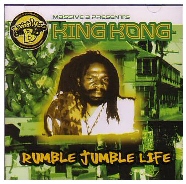 King Kong: Rumble Jumble Life, Massive B, undated
King Kong: Rumble Jumble Life, Massive B, undated
Rating: B
This King Kong isnt as big as the other King Kong, and he probably hasnt scaled the Empire State Building, but he communicates more effectively and sings a lot better.
This King Kong, AKA Devon Thomas, has been around the reggae scene since approximately forever, in JA, USA, Canada and the UK. Given his history and intimacy with the genre, who can judge where to draw the indistinct line between originator and imitator in the familiar sounds arising from his latest recording, Rumble Jumble Life? Maybe no line has to be drawn. Those familiar sounds arouse interest and pleasure: thats what matters now.
The powerful title track leads off the album with a classic dubwise roots arrangement from the Roots Radics Band. Inna disya rumble jumble life/Poor people pay the sacrifice, sings King Kong in his most empathetic voice. The tune and lyrics of the second track come almost straight from the church: I feel that joy within my soul. I like his phrasing. Theres something honest about it.
A catchy bit of rubadub is an emphatic reminder of his days as a hit maker with King Jammy: Trouble again/And the world is getting nervous. (Perhaps it should be Trouble again, again.) Things slow down considerably for a reworded take on Psalm 24, subdued hand drums echoing the sensitive vocal for a calm, pretty hymn. Another good roots tune follows, with lyrics in praise of the Lion of Judah.
The orientation is much more dancehall as we approach the albums second half, with additional comforting reminders of other singers and their songs. We get a spelling lesson (U-N-I-T-Y, that is unity) and a non-Tosh plea to Legalize It over quickly throbbing bass and rattling percussion. We learn that the singers so-called friends are no match for King Selassie I when it comes to loyalty and dependability, and later that the world is in chaos. Hooks and good performances abound.
It seems that King Kongs are fond of reappearing from time to time with emphatic displays of their capabilities. The movie version arrived with emphatic displays of hype and marketing as well, whereas the reggae version came with nominal packaging and feeble artwork. (There seems an inevitability about each, unfortunately.) Nonetheless, the actual film and the actual music are the important things, and I feel fortunate to have experienced both.
 Malika Madremana: Healing, 2005
Malika Madremana: Healing, 2005
Rating: B
There is a real solidity and allure to this album, clear from the onset of the first song.
That first song is Healing. A roots rhythm is established and immediately Madremana begins listing the ingredients for the highly recommended medicine known as reggae. It starts with ten cups of bass and ten drops of drum, proceeding from there. This wonder potion will promote healing, healing/from whatever youre feeling, although of course, Jah is part of the cure too. It all makes for a clever conceit, and although the track doesnt exhibit the sense of humour of a lot of blues songs based on illness and medicine, it still works effectively as an introduction to the pleasures of the album that follows. The melody line is appealing, the vocal is no-nonsense, and the rhythm is strong.
Although that tune is the title track, if youve heard anything already from Healing, its likely The Blood. Profound and intense, this song is a perceptive commentary on the history and consequence of slavery, with suitably pointed lyrics (the lives they took, they represent an unpayable debt) and rootsy arrangements. Better Than That is another tuneful powerhouse of a track with its self-improvement lyrics and lively interplay between singer and deejay Unda P.
Not everything here is as notable as these three, mind you. If theres a recurring weakness, its Madremanas inclination to crowd too many words into too small a space. She makes a gallant effort in her phrasing to accommodate all the syllables, and her enunciation is amazingly clear, but she ends up sounding rushed (heck, she is rushed) so much so it becomes almost chaotic. Some people can communicate using few words (Im thinking of early Toots), but this is the opposite. Hey Malika, take it easy; words dont appreciate being squeezed so hard, not outside the deejay mode. The music flows efficiently; so should the lyrics.
All things considered, though, this is awfully nice reggae, solid in its construction (engineered by The Scientist) and alluring in its delivery. Given our common human frailties, we often need healing, and fortunately Healing is available.
 Augustus Pablo: King Davids Melody, Shanachie, 2006
Augustus Pablo: King Davids Melody, Shanachie, 2006
Rating: B
Noted producer and dub poet Mutabaruka is quoted as saying, Augustus Pablo is to reggae what Beethoven is to classical music. Pablo has also been called the Miles Davis of the melodica. At first glance those seem to be heavy comparisons, but I think they boil down to this: were talking instrumental compositions; were talking instrumental proficiency.
Okay, lets consider the composing part. Maybe Muta was suggesting that, like Ludwig van, Augustus raised his particular brand of instrumental music to higher heights than it had been before he came along. Not quite into majestic, orchestral symphonies; more like what in classical music would be called divertimentos: short pieces, sweet and melodically appealing. But the two composers certainly shared a great feel for rhythm as well as a deep element of the sacred within their secular works.
Now to Pablos proficiency on the melodica, his preferred instrument. (He plays others too: bend your ear to his marvellous xylophone on West Abyssinia, for example.) Theres no doubting his technique, but Zamfir would be a more accurate comparison than Miles, given the limited expressive possibilities of pan-flute and melodica alike, compared to the infinite range of the trumpet. I may have ranted about this before, but using a melodica to create musical art is like using crayons for pictorial art: its not that it cant be done, but its hard to get the emotion in there. Despite the melodicas appropriate name and soothing quality.
On to King Davids Melody. This is a re-release of a 1983 album that had 11 tracks; this adds four more, all of which are worthy of hearing and fit smoothly into the flow. The accompaniment is top-notch, featuring the likes of Horsemouth Wallace and Leroy Sibbles. As to the difficult question of where this album lies in the hierarchy of Pablos vast output, lets just say its not as immediately engaging as certain other mostly instrumental (as distinct from dub) releases. East of the River Nile and This Is Augustus Pablo are widely considered his finest such albums, although Im partial to Original Rockers. But King Davids Melody would be fine as an unchallenging but tuneful alternate.
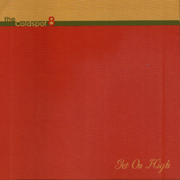 The Coldspot 8: Get On High, Stubborn Records, 2005
The Coldspot 8: Get On High, Stubborn Records, 2005
Rating: B
Who are The Coldspot 8?
Historic answer: a former ska band.
Possible geographic answer: maybe South Carolinians, given that in their liner notes they thank South Carolina for being the worst state in the country.
Mysteriously contradictory answer: eight names are listed in the credits; seven bedraggled and/or lumpy men are pictured in the grainy photo.
Only important answer at the moment: the creators of the appealing sounds coming from the speakers when Get On High starts to play.
What do The Coldspot 8 have to offer, musicwise?
UB40s ability to make catchy pop reggae.
A true reggae lovers love of tasty keyboard flavorings.
A true ska lovers appreciation of the power of crisp horn riffs.
A pros sense of programming, like knowing when to throw in a non-vocal dubbish excursion (at approximately track six) and when to kick in an up-tempo instrumental (approximately six tracks later).
David Lindleys sense of what a romp reggae can be (get a load of the emphatic drumming and other percussion).
What do The Coldspot 8 have to offer, lyricwise?
A pragmatists view of the world. (Whats done is done and is considered the past./You must brace yourself cuz the river moves fast/and then you roll down the river eternal.)
A Rastafarians belief in the presence of God in the individual (They Say).
The fatalism of Sisyphus (Find My Way).
A logophiles curiosity about the literal and symbolic meaning of words (These Words).
A refreshingly humble sense of self (I Could Be Wrong and My Little Life).
An intended but not always convincing inclination toward irony (Watch Ya Girl).
An embarrassing, childish, humorless, dumb, backward, misogynistic, poor-poor-pitiful-me rant (Everyday Pressure). Unless, of course, its meant ironically. See above.
A narrative afterthought about the life of Bob Marley.
Is The Coldspot 8 worth your time and money despite the one lapse in judgement?
Yeah, sure. You could easily develop a warm spot in your heart for Coldspot 8.





